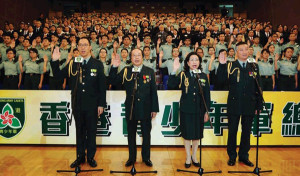Hong Kong Creates Cadet Force
 On January 18th, Hong Kong launched a new youth cadet force, the Hong Kong Army Cadets Association. Hong Kong government officials, representatives of the Chinese Communist Party (CCP), and top-ranking People's Liberation Army (PLA) members attended the inauguration ceremony along with approximately 300 Hong Kong youth. Led by Leung Tong Ching-yee, the wife of Hong Kong Chief Executive CY Leung, as well as by other Hong Kong government officials and PLA members, the force is the first Hong Kong-based training center for youth wishing to fight for their country, and enrollment claims to be on a completely voluntary basis for all youth ages 6 and up. Its goal is to raise awareness in participating youth about their responsibilities as “Chinese citizens.” Since the ceremony, however, the launch of the group has been mired in controversy: Hong Kong’s opposition party and citizens vying for more independence from China consider the new organization heavily influenced by Mainland China’s PLA, and fear that it will only offer the Chinese government more control over the city.
On January 18th, Hong Kong launched a new youth cadet force, the Hong Kong Army Cadets Association. Hong Kong government officials, representatives of the Chinese Communist Party (CCP), and top-ranking People's Liberation Army (PLA) members attended the inauguration ceremony along with approximately 300 Hong Kong youth. Led by Leung Tong Ching-yee, the wife of Hong Kong Chief Executive CY Leung, as well as by other Hong Kong government officials and PLA members, the force is the first Hong Kong-based training center for youth wishing to fight for their country, and enrollment claims to be on a completely voluntary basis for all youth ages 6 and up. Its goal is to raise awareness in participating youth about their responsibilities as “Chinese citizens.” Since the ceremony, however, the launch of the group has been mired in controversy: Hong Kong’s opposition party and citizens vying for more independence from China consider the new organization heavily influenced by Mainland China’s PLA, and fear that it will only offer the Chinese government more control over the city.
Because of its status as a Special Administrative Region of China, the semi-autonomous city of Hong Kong has never had to ensure its own defense nor does it have its own army; rather, the PLA is responsible for the city’s security in matters beyond what local police forces can handle. However, the force’s inauguration comes after tumultuous months for Hong Kong. In September, citizens thought their city would receive more autonomy in the near future by gaining Chinese authorization to host elections in 2017 in which an opposing party could participate freely and fairly. However, the CCP announced that it would be naming a committee to authorize candidates wishing to run, guaranteeing that no candidate who opposed it could participate in elections, thus keeping full control over Hong Kong’s government. This announcement sparked months of outrage and protests that have only just begun to calm down following police crackdowns.
The protests make the timing of the inauguration rather suspicious, and critics and international media outlets have pointed that out. Although the media outlet China Daily acknowledged and confirmed these claims in a rare mention of its opposition, it also called the measures “necessary […] in preparing the youths of Hong Kong for assuming their civic responsibilities in due time,” a rather eerie claim with an almost threatening nature. The CCP also made sure that the ceremony went uninterrupted by hosting it on Stonecutter’s Island, Hong Kong’s PLA naval base, and inviting only pro-Beijing media outlets like China Daily and Hong Kong-based Wen Wei Po, who in their subsequent articles represented only government voices praising the force.
Beyond the ceremony’s secrecy and peculiar timing, other aspects of the ceremony have been widely criticized. Although it is not so much the idea of Hong Kong having its own cadet force that is controversial, pro-democracy supporters decry the force’s similarity to the PLA: its uniforms are similar to PLA military uniforms, and it is also adopting PLA foot drills to train enrolled youth. Supporters claim that this will simply give participants a “stronger sense of national identity,” but critics see it as another way for China to gain influence over the force’s members. In addition, the South China Morning Post reported that some boys present at the ceremony had only signed up as volunteers or spectators, with no intention of joining the corps. Although official numbers claimed there were 300 recruits present, it seems this was a deliberate attempt to exaggerate the force’s success. Following SCMP’s report, Bunny Chan Chung-bun, a member of the force’s administration, acknowledged that there were only a few dozen actual recruits, while the rest of the boys present at the ceremony had not joined the force.
Thus, critics of the CCP have expressed outrage over what they consider a new attempt to regain control of Hong Kong by “brainwashing” and “re-educating” its youth in a time where more and more young people are turning against the mainland government. The use of this kind of vocabulary reminiscent of the Cultural Revolution under Mao Zedong shows just how seriously critics are taking this issue. The force’s creation also threatens to polarize Hong Kong even more, as supporters of communism and democracy will have yet another contentious issue to discuss. Finally, for the opposition, it presents a risk for Hong Kong’s future generation and for democracy on the island as a whole, and shows that China is nowhere close to releasing its tight grip on Hong Kong.
